Amazon’s Fulfilment by Amazon (FBA) has been the go-to fulfilment solution for e-commerce businesses for years. By offering inventory storage, order fulfilment, and customer service under one roof, FBA revolutionised how sellers manage logistics. According to a 2024 report, 82% of Amazon sellers use Fulfilment by Amazon (FBA), with 64% relying exclusively on this service.
With rising fees, limited inventory control, and increasing expectations for faster delivery, many businesses are questioning whether FBA is still the right choice. Whether you’re a growing startup or an established brand, it’s time to explore new ways to handle your logistics and fulfilment.
In this article, we’ll walk you through the top alternatives to Amazon FBA that can give your business more control, flexibility, and the growth potential it needs.
Pros and Cons of FBA
Amazon FBA has been a popular choice for e-commerce sellers aiming to streamline their fulfilment process. It offers convenience, access to Prime customers, and the backing of Amazon’s logistics network. However, it’s not a one-size-fits-all solution. As costs rise and control becomes a priority, many businesses are rethinking their fulfilment strategy. Here's a quick look at the pros and cons of using FBA.
Pros of FBA
Amazon FBA is a highly popular and efficient solution for e-commerce businesses, offering several key advantages:
- Access to Amazon’s Vast Customer Base: Sellers using FBA benefit from Amazon's massive reach, providing access to millions of customers globally.
- Prime Eligibility: FBA items are automatically eligible for Amazon Prime, which boosts visibility and sales.
- Simplified Logistics: Amazon handles storage, packing, shipping, and customer service, allowing sellers to focus on product creation and marketing.
- Customer Support: Amazon offers top-notch customer service and returns management, making it easier for sellers to manage issues with little effort.
Cons of FBA
While FBA offers many benefits, it also has its drawbacks, especially for businesses looking for more control and flexibility:
- High Fees: FBA charges various fees, including storage, packing, and shipping fees, which can quickly add up and eat into your margins. Rising costs in recent years have caused many sellers to reassess the value of the service.
- Limited Control Over Inventory: When you use FBA, you surrender control over inventory management and fulfilment processes. Amazon stores your inventory in its warehouses, which can lead to stockouts or overstocking if not monitored carefully.
- Reduced Branding Opportunities: FBA doesn’t allow for much customisation in the packaging or branding of your products. This can lead to a generic unboxing experience that doesn’t foster a strong brand identity.
Why You Need an Amazon FBA Alternative
Given the limitations of FBA, such as high fees, limited inventory control, and a lack of branding flexibility, many businesses are turning to Amazon FBA alternatives that provide:
- Lower Costs: Alternatives like WareOne offer more transparent, customisable pricing with pay-as-you-go models.
- Better Control: These alternatives allow businesses to manage inventory, packing, and shipping more flexibly and precisely.
- Customisation & Branding: Unlike FBA, which uses standard packaging, these platforms offer more opportunities for branded, personalised packaging.
Criteria for Evaluating Amazon FBA Alternatives
.jpg)
When evaluating potential alternatives to Amazon FBA, consider the following key criteria to ensure you choose the best solution for your business:
- Pricing Structure: Does the service offer a transparent pricing model? Look for platforms with flexible, pay-as-you-go pricing or tiered rates to avoid hidden fees.
- Shipping Speed and Delivery Options: Does the alternative offer fast shipping options, such as 2-day or next-day delivery? Fast shipping can help improve customer satisfaction and sales.
- Customisation and Branding: Are there options for custom packaging or branded experiences? A more personalised fulfilment service can help reinforce your brand identity.
- Geographical Coverage: Consider the geographical reach of the service. Does it cover domestic and international shipping, helping you expand to global markets?
- Customer Support and Service Quality: Evaluate the level of customer support offered. Prompt, reliable support can make a big difference, especially if there are issues with orders or inventory.
- Flexibility and Scalability: Does the service offer scalability to meet your growing business needs? Depending on demand fluctuations, it should allow you to scale your fulfilment up or down.
- User Interface and Software Usability: The platform should be easy to use, featuring an intuitive dashboard that enables real-time order tracking, inventory updates, and management.
To find the best fit for your business, it’s important to evaluate fulfilment providers based on specific criteria that affect cost, control, and customer experience. Let’s explore some of the top alternatives, starting with WareOne.
Top 5 Alternatives to Amazon FBA
Many sellers are turning to alternatives to Amazon FBA for better control, reduced costs, and improved logistics. Here are the top 5 FBA alternatives for 2025 that offer flexibility, scalability, and power.
1. WareOne
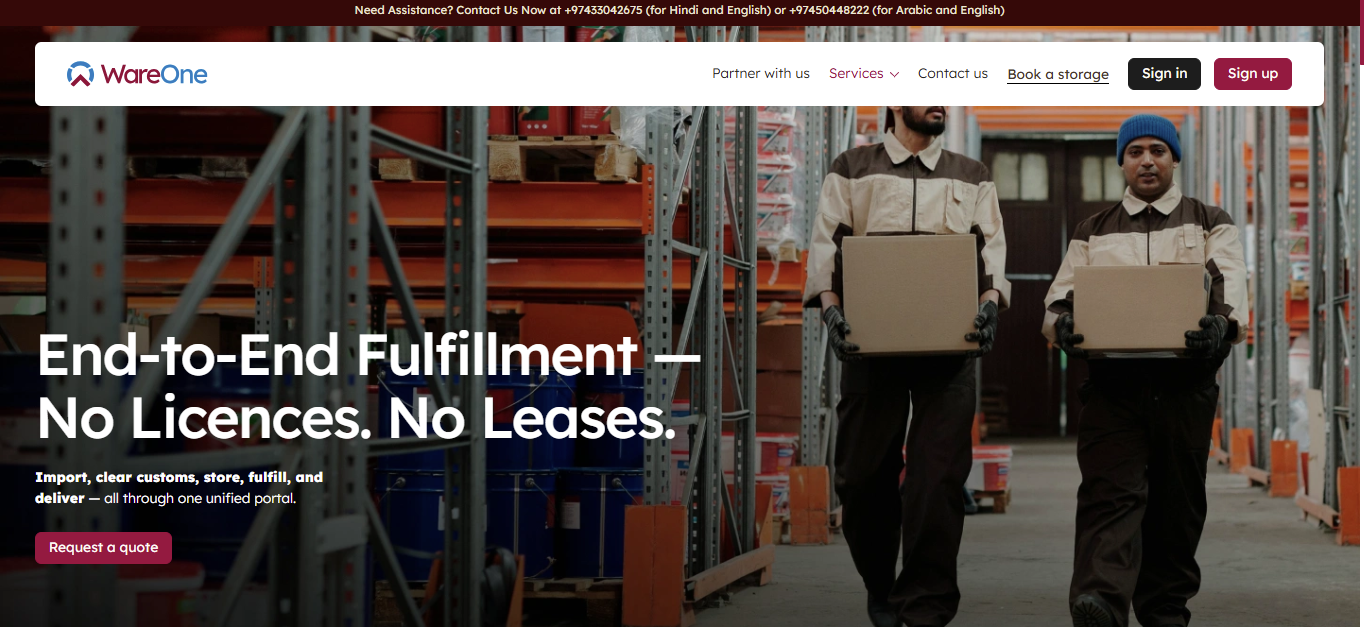
For small and medium enterprises (SMEs), ecommerce companies, and D2C brands looking to scale efficiently without being tied down by long-term contracts or high fixed costs, WareOne stands out as a great alternative to Amazon FBA. Offering on-demand warehousing and customised logistics solutions, WareOne is uniquely designed to meet the evolving needs of growing businesses.
Instead of worrying about overcommitting to warehouse space or incurring excessive shipping fees, WareOne provides SMEs with the flexibility to scale up or down based on demand. Whether you’re just starting to expand or need a solution that grows with your business, WareOne empowers you to manage your logistics while keeping costs under control.
Key Features of WareOne:
- Pay-as-you-use Warehousing: Only pay for the space you need, when you need it. No long-term contracts or hidden fees. Just affordable, flexible pricing.
- Customisable Fulfilment Services: Tailor your fulfilment process to your unique needs, including packing, shipping, and inventory management. It’s a solution that adapts to your business, not the other way around.
- Seamless Software Integration: WareOne’s user-friendly platform integrates effortlessly with your existing inventory systems and leverages advanced technologies like OMS, WMS, and TMS. It offers real-time tracking of stock levels, orders, shipments, and delivery performance, providing actionable insights, monitoring SLAs, and optimising cost per order to streamline your end-to-end operations.
- Comprehensive Logistics Solutions: WareOne provides an all-in-one logistics platform that integrates services such as importer-of-record, customs, storage, and last-mile delivery, all with a single invoice for zero complexity. Whether you're a small business, D2C brand, or an enterprise retailer, WareOne adapts to your unique needs, offering hassle-free returns, fast delivery (same-day and next-day across Qatar), and seamless global shipping for cross-border commerce.
- Flexible Solutions for Every Business Size: WareOne is designed for businesses of all sizes, from small eCommerce shops and social sellers seeking pro-level storage and delivery without long-term commitments, to large omni-channel retailers with complex inventory needs. No matter your scale, WareOne offers flexible, scalable solutions that grow with your business.
Why WareOne is a Game-Changer for Businesses in 2025
WareOne is the growth partner for e-commerce, D2C, and businesses with growing needs in 2025 and beyond. Its scalable nature means you can adjust your logistics as your business grows, without the burdens of high overhead costs. Whether you’re managing seasonal fluctuations, testing new products, or expanding your product line, WareOne offers the ultimate flexibility.
- Boost efficiency without the overhead: WareOne’s on-demand warehousing means you don’t need to worry about maintaining expensive, unused storage space. Instead, you can optimise costs by scaling your warehousing space based on actual needs.
- Focus on what matters: Let WareOne’s logistics expertise handle the complex details, so you can concentrate on growing your business, improving your product, and enhancing customer satisfaction.
- Scalability for sustainable growth: As your business grows, WareOne ensures your fulfilment process grows with you. No more worrying about the logistics hurdles that come with expansion, WareOne makes it easy and seamless.
2. ShipBob
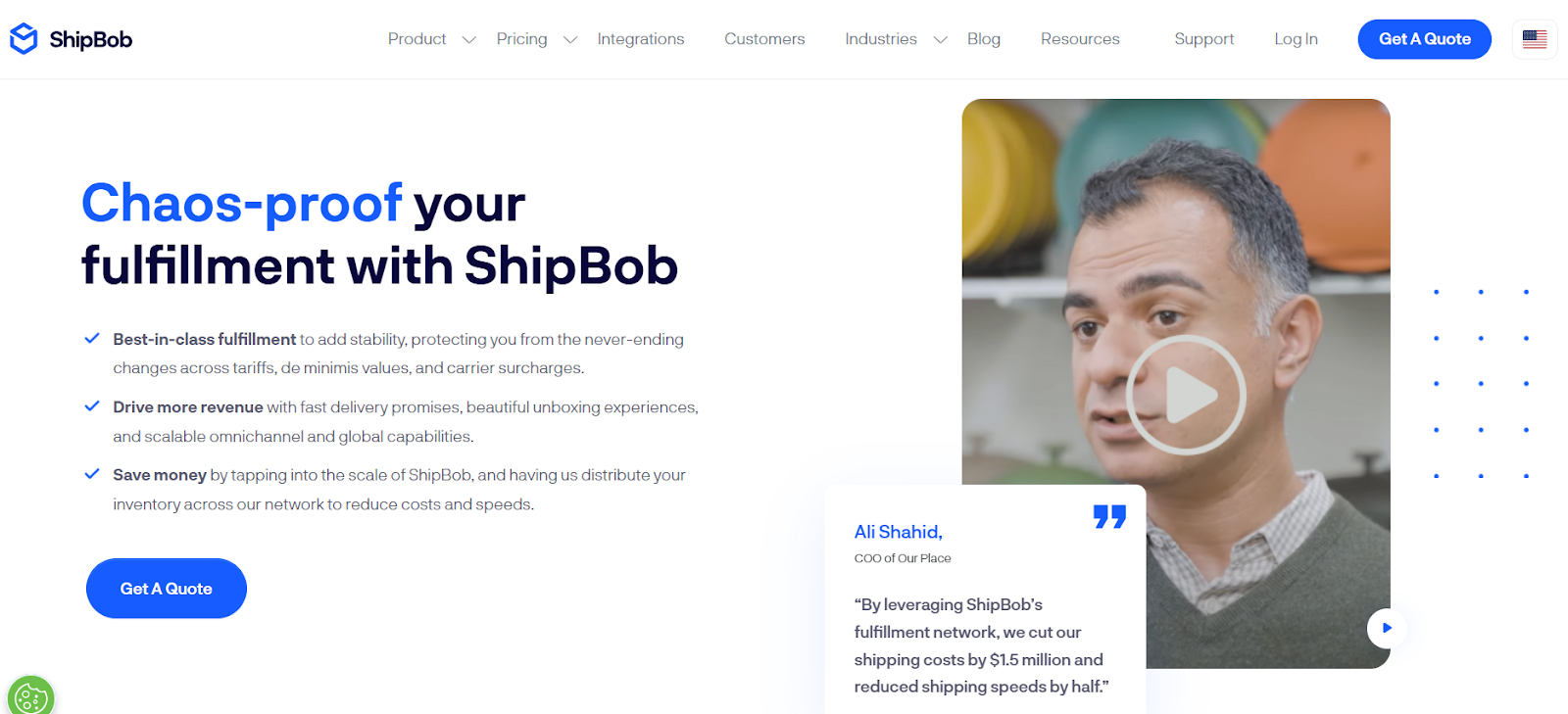
ShipBob has become one of the most popular alternatives to Amazon FBA, offering a comprehensive fulfilment and logistics platform. Known for its ease of use and integration with major e-commerce platforms, ShipBob provides businesses with access to multiple warehouses and real-time order tracking, allowing sellers to deliver products faster and more cost-effectively.
Key Features:
- Multiple warehouse locations across the U.S. and internationally.
- Real-time order tracking and visibility.
- Integration with major platforms like Shopify, Walmart, and Etsy.
With ShipBob, businesses can access an extensive network of fulfilment centres, which means faster shipping to various regions. Additionally, ShipBob offers a more transparent pricing structure than Amazon FBA, which can significantly reduce costs for growing businesses.
3. ShipMonk
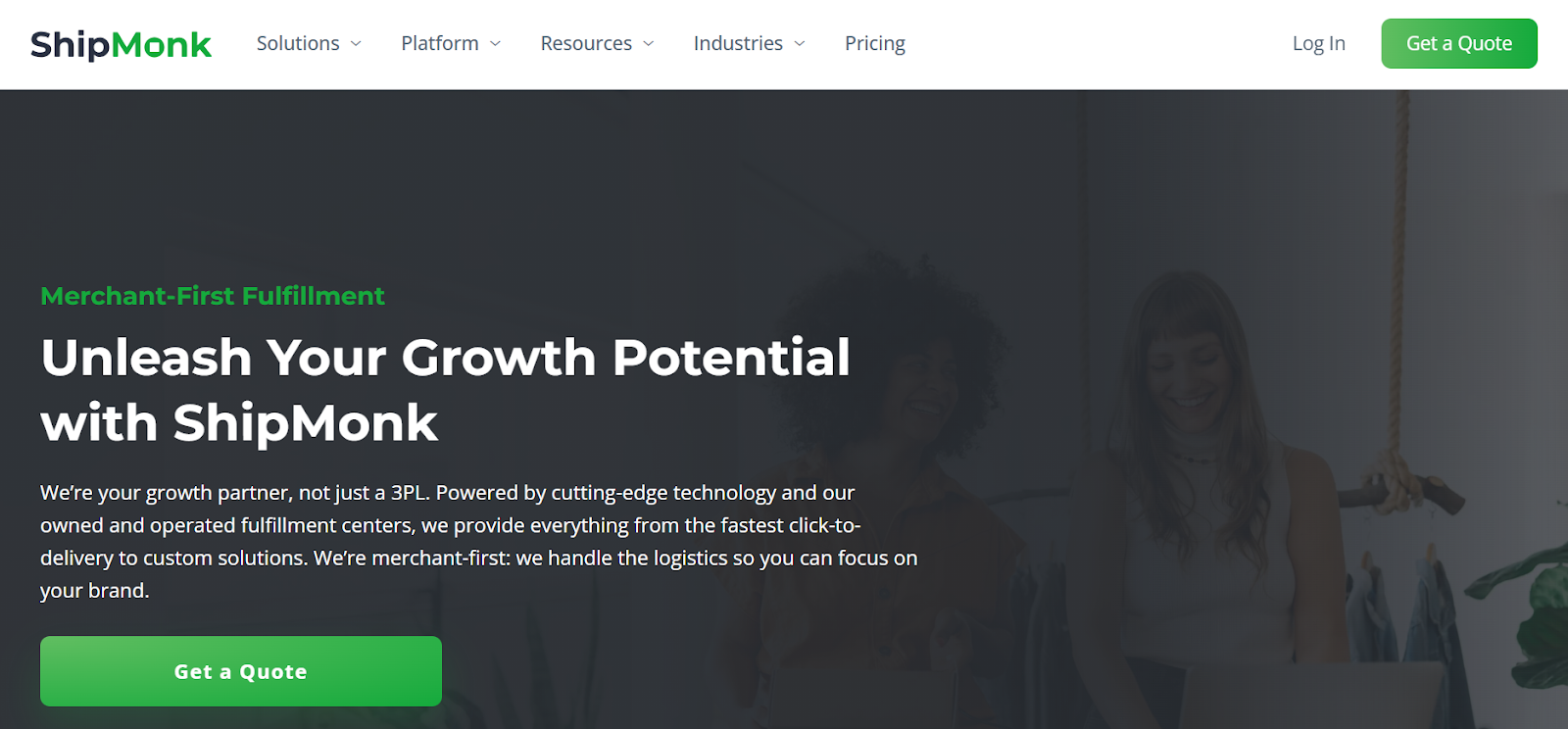
ShipMonk is an excellent alternative for businesses looking for tailored fulfilment solutions. With a strong focus on customisation and integration, ShipMonk enables e-commerce sellers to streamline their operations while offering a more personalised experience compared to Amazon FBA.
Key Features:
- Custom packaging options for branding.
- Subscription box services for niche markets.
- Integration with platforms like WooCommerce, BigCommerce, and more.
ShipMonk stands out for its ability to cater to specific business needs, such as custom packaging or managing recurring subscription orders. It’s a great FBA alternative for businesses that want more control over branding and the customer experience.
4. Flexport
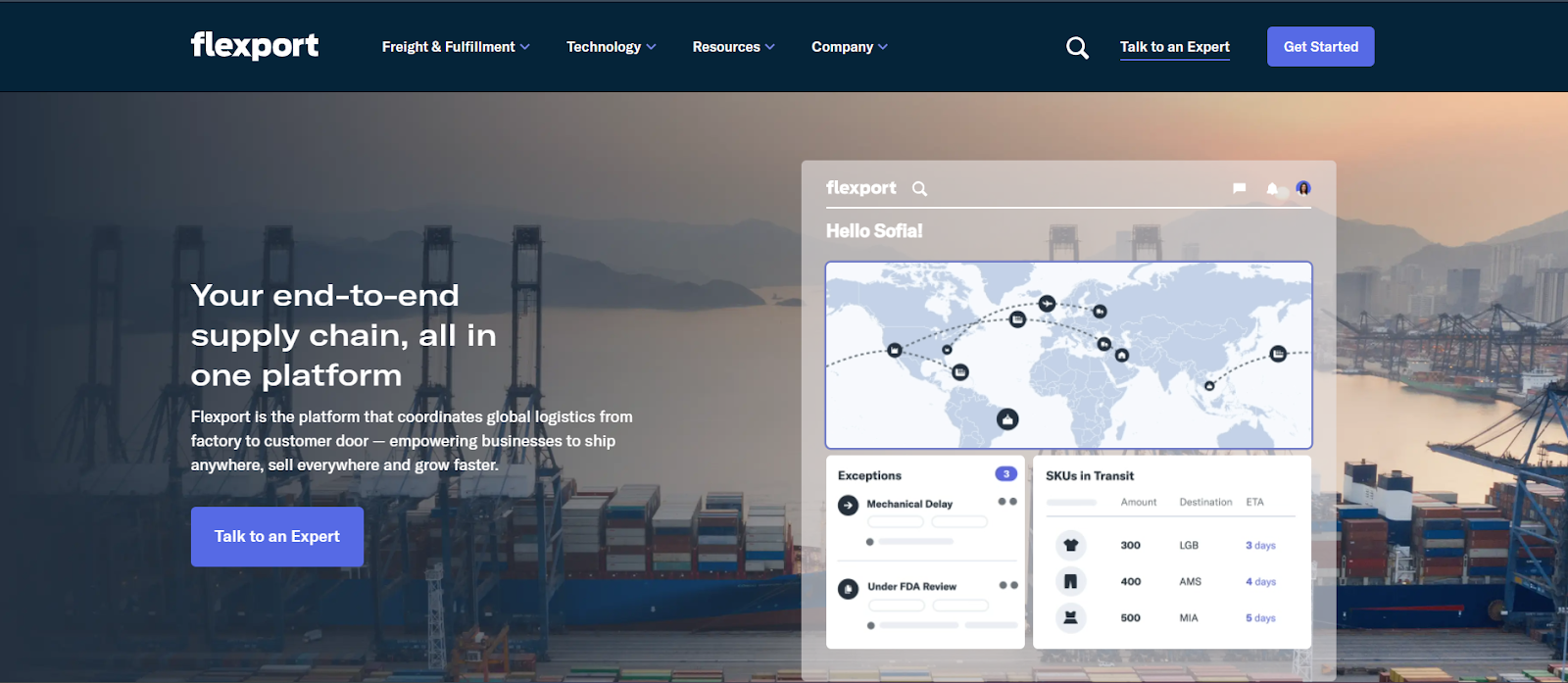
Flexport, formerly known as Deliveryy, is a fast-growing FBA alternative that offers full-service logistics tailored for modern e-commerce brands. With a strong focus on speed, flexibility, and end-to-end visibility, Flexxport delivers a tech-driven fulfilment experience that scales with your business.
Key Features:
- Fast Fulfilment Options: Same-day and next-day delivery to keep your customers happy and loyal.
- Complete Logistics Stack: Everything is handled under one roof, from warehousing and inventory management to order processing and returns.
- Platform Integrations: Connects with Shopify, WooCommerce, and other platforms for seamless order flow and real-time updates.
Flexxport is ideal for businesses looking to streamline their operations, improve delivery speed, and scale efficiently, without the constraints of traditional fulfilment models.
5. Red Stag Fulfilment
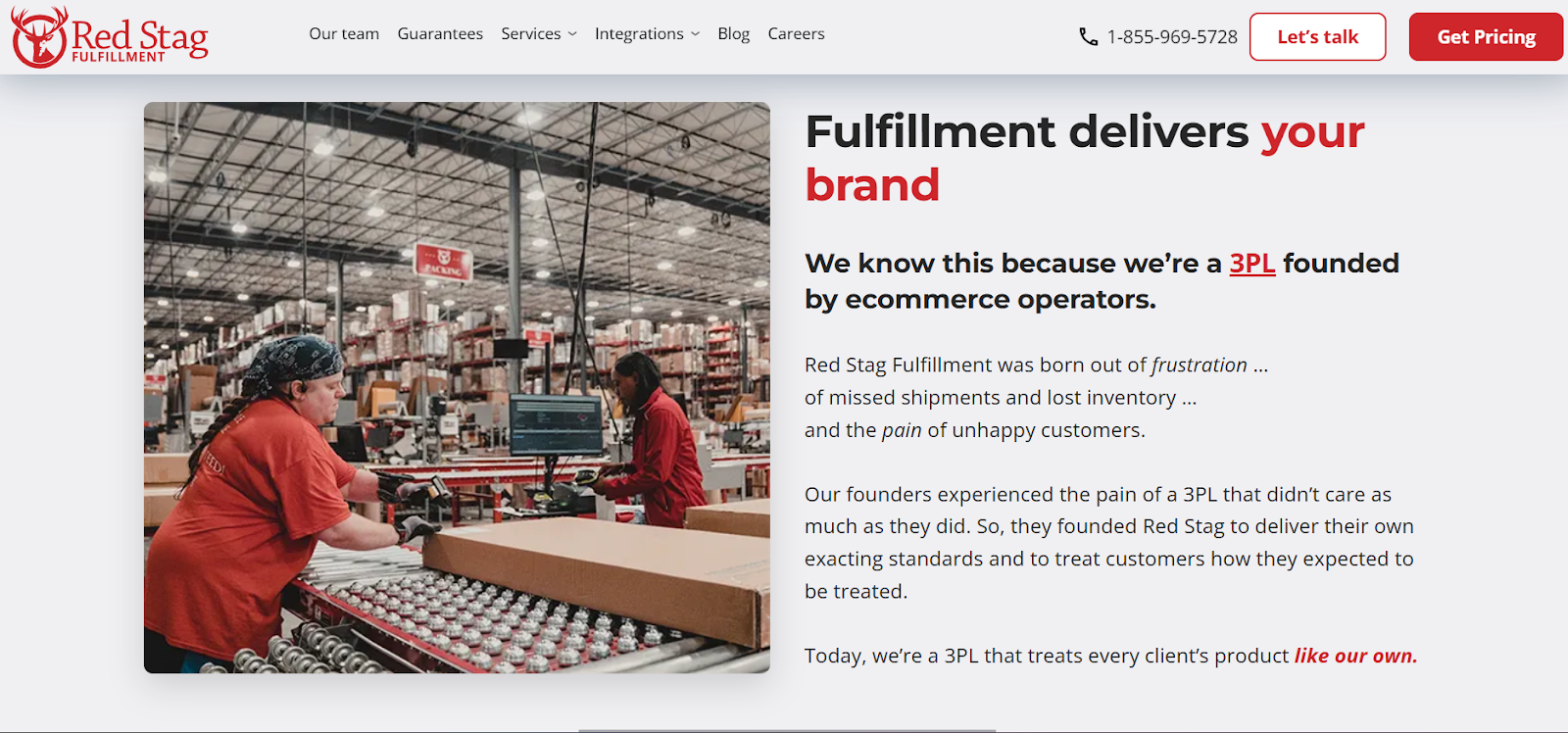
Red Stag Fulfilment offers a specialised service for businesses selling large or heavy products, focusing on bulky and oversized items. Unlike Amazon FBA, which can be cumbersome for these products, Red Stag ensures products are handled efficiently and with care.
Key Features:
- Specialisation in bulky and oversized products.
- Real-time order tracking and high-quality customer service.
- Integration with multiple sales channels, including Shopify and Amazon.
Red Stag’s specialised approach to immense item fulfilment makes it an excellent choice for businesses with a product line that includes furniture, appliances, or other heavy items. Their high accuracy and low damage rates provide peace of mind for sellers dealing with fragile or heavy products.
Partner with a Fulfilment Provider that Scales with your Business
While Amazon's Fulfilment by Amazon (FBA) has been a popular choice for e-commerce businesses seeking streamlined logistics, it's essential to recognise both its advantages and limitations.
FBA offers benefits such as access to Amazon's vast customer base, eligibility for Prime, and simplified order processing. However, challenges like rising fees, limited branding opportunities, and reduced control over inventory management have led many sellers to explore alternative fulfilment solutions.
If you're seeking a fulfilment partner that offers flexibility, scalability, and greater control over your logistics operations, consider WareOne. With its pay-as-you-use warehousing, customisable fulfilment services, and seamless integration with your existing systems, WareOne empowers your business to adapt and grow without the constraints often associated with larger platforms.
Take the Next Step with WareOne. Contact WareOne today to discover how our tailored solutions can meet your unique business needs and drive your success in 2025 and beyond.
.jpg)